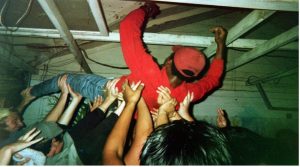My interest in a career in the creative industry started early in my academic endeavors at the University of North Texas, a college known for its local music and art scene. However, I never expected that interest to manifest into pursuing intellectual property (IP) until I started law school at Loyola University Chicago.
An Eclectic College Community
During my first year of college, I lived in what was considered the “music dorm” on campus, known as Bruce Hall. Bruce Hall was deemed the “music dorm” because of its nickname for housing mostly Music and Jazz majors. In addition, its location was across from the music building where famous Grammy winning artists like Norah Jones and the school’s One O’Clock Lab Band got their start. The central location and history as the oldest dorm on campus led me to choose that residence hall over others on campus. Even though I dreamed of attending law school and was majoring in Rhetoric and Writing, I was excited to meet students in different majors with passions different than my own. I quickly knew I made the right decision when I saw the culture and community of students with whom I began to become friends.
In contrast to many of my friends who majored in music and started bands of their own, I wrote for the Arts and Life section of the North Texas Daily, the student run newspaper. I interviewed local artists and kept up with events happening on campus and in the community. I also attended many house shows or and other art-related events where most students would gather on the weekends. Because I found myself so often surrounded by people or settings in the creative industry, I hoped to develop a legal career working with creative industries but was not sure on what areas of law would allow me to do so.

Exploring an “Ocean” of IP
As law school drew near, I began to dive into what kind of law I wanted to pursue. Initially, I skipped over IP because I thought it was confined to those with science backgrounds, not writing and rhetoric like me. Then, I stumbled on an article about Frank Ocean’s writing credits on his critically acclaimed album “Blonde”. The article covered a lawsuit between Frank Ocean and a producer who he often collaborated with, Om’Mas Keith. Frank Ocean brought suit against Keith for filing for song writing credits for his work on Blonde. Frank Ocean claimed the two had an agreement of a flat rate to be paid for his work instead of song-writing credits. Keith claimed no agreement of the kind had been established. In response, Keith filed a counterclaim, alleging that he had not given permission for the release of the music and had not received any royalties for his work. The claims eventually were dropped in both cases, with the two privately reaching a settlement.
After reading the Frank Ocean article, I did a deep dive into the firm representing him and the work they did. I learned how big of a legal industry there is that works behind the scenes for musicians, film makers, and many other types of artists. Especially in IP law, this industry looks after the rights and protections for new ideas, patents, trademarks, and copyrights for artists worldwide.
Then, during my first semester of law school, I not only joined the IP Law Society at Loyola, but I also discovered my interests in artist rights and ownership embedded in IP, such as copyright and trademark law. I have a deep appreciation for how art and legal protection come together to play an important role in safeguarding the rights of artists. Discovering how intellectual property laws can protect and maintain a supportive and fair space for artists is something I am passionate about.

Nerve-Free Networking: Crushing the Jitters
To learn more about my newfound interest in IP, I attended the Intellectual Property Association of Chicago (IPLAC)’s Speed Networking Event hosted at Loyola. While I was excited to attend, I was also nervous because it was my first networking event as a law student and first IP event. To prepare, I researched the lawyers that would be attending and became excited to meet many Loyola alumni graduates, especially those with non-STEM backgrounds like me!
When I arrived, I began socializing with other Loyola students, as well as students from other Chicago law schools. Talking with other students our law school experience and aspirations made it easy for me let go of any insecurities about my non-science background knowing I was not the only one. When I started “speed networking” I felt reassured by the supportive community in Chicago for students like me, who are interested in the non-patent aspects of IP law related to artists and ownership. Some of the lawyers I spoke to had careers in fashion and art industries. I also spoke to attorneys with STEM backgrounds who worked alongside those without science degrees and found success in the world of IP. When I expressed concerns I had on my lack of a STEM background, the attorneys always met me with positivity and encouragement of navigating that process.
I specifically remember advice one of the lawyers gave to us when commenting on working in IP without a STEM background. She touched on the importance of a lawyer being able to communicate a subject that few people know about in a comprehensible way for people in a court room to understand. She worked in patent litigation and described her job often being to “translate” the complicated subjects of IP into a way any judge or jury can understand.
Diving into Optimism and IP Opportunities
Hearing about the different types of jobs in the IP law world at the IPLAC networking event through the lawyers helped me gain a better understanding of the practice of IP law. For example, prior to the event I was not aware of the ability of doing patent litigation with a non-STEM background. While it’s easy to read about successful IP lawyers without STEM backgrounds, meeting practitioners first-hand in the city where I am studying and aspiring to practice law one day left me feeling more optimistic and less apprehensive about navigating a career in IP law. This experience grew my excitement in my ongoing journey of becoming a lawyer. I would love to work to support musicians and artists by protecting and securing their creative work through IP law, all while appreciating and understanding their artistry through the process.

Grace Cottingham
Assistant Blogger
Loyola University Chicago School of Law, J.D. 2026
